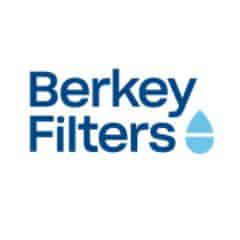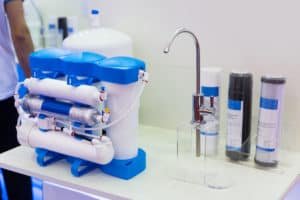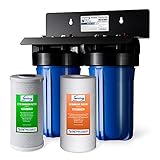We like to share product recommendations with you and hope you like them! Just to make you aware Water Filter Data may collect a small share of sales or other compensation from the links on this page.
Is the Berkey water filter the best in terms of value and practicality? Or is reverse osmosis the most effective method for removing contaminants? If you’re reading this article, chances are you’ve already made up your mind about buying a solar water filter system. You want to make sure you’re getting the best equipment for the price. If that’s the case then you’re in luck because we have done the dirty work for you. Berkey vs Reverse Osmosis, below we’ve broken out some comparison points between the two.
Introducing Berkey Vs Reverse Osmosis
Berkey Filters

Berkey purification systems are countertop filtration frameworks that channel water slowly over a period of time. Berkey’s units are round and hollow, planned like expansive tin cans, in silver stainless steel. They comprise two chambers, one over the other, with a match of Dark Berkey filtration components isolating the two.
When water is included in the Berkey’s beat chamber, it passes through the Black Berkey purification elements, which trap contaminants, permitting as it were clean water to pass into the lower chamber. Since they’re not associated with a water supply, the Berkey frameworks don’t utilize the control of water weight to constrain water through the components. Instead, they depend on gravity to channel tap water at a slower rate.
PROS
✓ Filters up to 99.9999 percent of microscopic organisms and 99.9999 percent of viruses
✓ Filters chlorine effectively
✓ Can filter about 3,000 gallons of water
✓ Does not eliminate essential minerals from the water
✓ Removes up to 95 percent of heavy metals
CONS
X You are required to refill the chamber
X The flow rate is quite slow
X You’ll need a different filter to get rid of fluoride
Reverse Osmosis Systems

Reverse Osmosis filters for water have a design that’s virtually the complete opposite of Berkey. They are associated up to a water supply, usually underneath a kitchen sink; in some cases at a home’s water point of the section. The systems are usually made up of a few channels, counting a pre–stage sediment filter, an actuated carbon or carbon square channel, and a post sediment filter.
The highlight that creates RO systems so one of a kind is their reverse osmosis membrane. Water is constrained through this membrane, which contains pores so modest that only small water particles can pass through. Contaminants like heavy metals, chemicals, and VOCs are too large to pass through the layer, they’re flushed away absent with the wastewater.
PROS
✓ Gets rid of impurities, chemicals, and potentially harmful microorganisms
✓ Easy to install
✓ Easy maintenance
✓ Improves the taste by removing bad odors and tastes
✓ The RO process is fully automated; hence, efficient
CONS
X The initial setup is quite costly
X Produces a lot of wastewater
X Removes essential minerals from the water
Berkey VS Reverse Osmosis – Face To Face!
Installation
Reverse Osmosis System
The installation of a Reverse Osmosis System is not terribly difficult, but you’d need somebody generally convenient or with a little plumbing information performing the work. A few companies will do this free of charge, and some RO systems are DIY.
This all depends on the size of the system, the company, and any contract that is signed.
Berkey systems
The Berkey system on the other hand DOES NOT require any ability and is implied for the lamen. Upon a receipt of a Berkey, add up to preparing and gathering time is approximately 10 – 15 minutes.
The Berkey is standalone and works autonomously of your plumbing, so you’ll be able to move and set up the system where you crave.
Performance Comparison
Reverse Osmosis Systems
Comparing Berkey and Reverse Osmosis for speed of performance, Reverse Osmosis is the clear champ! Giving your claim home’s water pressure is satisfactory – at least 40 PSI – you shouldn’t have to wait for more than a second to get access to clean water.
As soon as you turn on your faucet, water streaming through your plumbing will pass through the Reverse Osmosis System, which can create the filtered water that comes out of your faucet.
In general, Reverse Osmosis systems are also able to high – quality performance when it comes to effectiveness.
Of course, it depends on the manufacturer you want, but the most excellent RO systems can remove up to 99.9 percent of contaminants, counting pesticides, viruses, bacteria, herbicides, heavy metals, sediment, arsenic, sulfate, turbidity, hardness, and TDS.
Numerous Reverse Osmosis water filtration units are also NFS certified to remove these contaminants from the tap.
One thing to bear in mind with RO systems is that they are relatively wasteful during their process of producing filtered water. This is the only real performance letdown of the systems – as water is forced through the RO membrane, wastewater containing contaminants are flushed down a drain.
In case you’re looking to maintain your current levels of tap water use, RO filters may not be for you.
Berkey Systems
Being gravity water filters, the Berkey purification elements are actually slower at filtering water than reverse osmosis systems, which offer a more prompt drinking water solution. Judging execution on speed, you’ll have to be arranged to hold up longer for the Berkey systems to completely filter water – for example, the 2.75 – gallon Berkey takes approximately 2 hours and 45 minutes to filter a full chamber of water.
But if you have the time to wait for a Berkey filter to do its job, you’ll be exceptionally cheerful with its performance in terms of water quality. Berkey purification systems have been autonomously tried by researchers, offering reassurance that the Berkey components are able to remove all the contaminants claimed by the manufacturer, counting heavy metals, chlorine, fluorine, fluoride, and other harmful toxins.
They do this without removing the advantageous mineral, like magnesium and calcium, from water. In spite of the fact that the adequacy of Berkey’s filters really does live up to the company’s claims, it would be useful to Berkey if they were to obtain an NFS certification for contaminant removal, which ought to offer assistance put a stop to the questionable reviews online claiming that Berkey is a scam.
Models And Upfront Cost
Reverse Osmosis System
Reverse Osmosis systems are some of the foremost costly water filtration solutions available. They generally cost around $300 upwards, and a few can indeed take a toll more than $1,000 – particularly the whole home RO systems.
However, you’ll get a great bargain with an RO system, and you may be able to find one on offer for around $250.
There are two main Reverse Osmosis designs: under-sink RO systems and whole-home RO systems. Some well known Reverse Osmosis systems are:
- Waterdrop G3 Reverse Osmosis System
- NU Aqua Tankless Reverse Osmosis System
- NU Aqua 7 Stage Reverse Osmosis System
- Pentair-Pelican PRO-RO Reverse Osmosis System
Under sink RO systems are associated up to the cold water line in the storage space beneath a kitchen faucet.
Most of these systems are decently bulky, consisting of multiple separate filter cartridges. Their design, which incorporates a wastewater pipe, makes them very tricky to install unless you happen to be a plumbing master.
Entire home RO systems are very similar, but they usually have a larger capacity, and they’re installed at a home’s water point of entry – ordinarily, in a basement or a garage, sometime before the water reaches the heater.
The included bonus of an RO system is that you can include extra components to the system, like UV lights, which kill all microorganisms in filtered water, making it more secure to drink.
Berkey systems
Berkey’s systems are sold at a mid–range cost for drinking water filter solutions. There are multiple sizes of the Berkey, and the bigger the size – the higher the cost.
You can purchase a Berkey countertop unit, with two included Berkey purification components, for between $250 and $360. There’s also an alternative option to purchasing a filter with another two Berkey purification components, which costs roughly $100 additional.
Here is a list of the systems available:
- The Travel Berkey (1.5 gallons)
- The Big Berkey (2.25 gallons)
- The Berkey Light (2.75 gallons)
- The Royal Berkey (3.25 gallons)
- The Imperial Berkey (4.5 gallons)
- The Crown Berkey (6 gallons)
Berkey’s Big and Royal Berkey systems are designed for small to medium families, whereas the Crown and Imperial Berkey are suited to large families. The Berkey Light is a cheaper alternative to the Big Berkey and the Royal Berkey, and Berkey’s Travel option has a portable design that’s perfect for taking on the road.
Filter Lifespan And Replacement Coasts
Reverse Osmosis Systems
Reverse Osmosis membranes ordinarily last for two years before they need replacing, so once again, there’s not much maintenance required for the membranes themselves after you’ve installed the system.
The carbon and sediment filter cartridges that come with the system will likely require replacing more habitually; every 6 months or each year. There’s more maintenance for a Reverse Osmosis System than for a Berkey unit, and it’s because water filtration is split into numerous stages, each requiring its own filter.
You can buy a replacement RO membrane for between $30 and $50. Replacement water filter components come in at between $10 and $40, depending on the brand you’re buying from. There are two main reverse osmosis designs: under-sink RO systems and whole-home RO systems.
In spite of the fact that the costs are smaller than Berkey’s, once you put them together and consider that they’ll need to be paid more regularly, Berkey’s filter components work out cheaper within the long run. Comparing Berkey and RO systems, Berkey is the more reasonable of the two.
Berkey systems
Berkey’s filtration components have an impressive lifespan of 6,000 gallons per pair, meaning once you’ve set up the system with the introductory components, you won’t have to stress about buying replacements at least for four years.
It’s prescribed that we drink half a gallon of water a day, which means that if you have a family of four, it’s suggested that you drink roughly 2 gallons of water a day. Compare this to the Berkey elements’ 6,000-gallon life expectancy, and you’ll be able to see how you won’t have to put any money into the system for a long time after your initial purchase.
It’s obvious, considering their impressive life expectancy, that the Berkey purification elements are on the more costly side to replace, costing around $120 per set of two.
Distilled Vs Purified Water
The foremost complicated part of this can be the way that distilled water is purified water. That is correct – the procedure of distillation is one of the advances used to purify water. Reverse Osmosis is another development utilized to purify water.
The huge difference is that bubbling water consumes a large amount of energy. Consider this: all the water must be boiled until there’s none left (turned into steam). That is a ton of energy!
On the flip side, Reverse Osmosis innovation consumes far less energy. Systems like this use proficient energy pump to play out their purification. And the final result is acceptable. The familiar hearsay about distilled water tasting lever or used for steam irons is not veritable.
The reason distilled water filter was recommended for irons is based on the fact that the minerals that stuck up in small steam gaps have been removed – which keeps your iron decent and clean. There is nothing off–base with drinking it. A composed and working purification system will convey to profoundly pure water without fail, regardless of varieties in the source water’s quality. This isn’t substantial for spring water, tap water, or filtered water.
Hence, purified water is seen as the target benchmark against which the purity of different water is judged.
Berkey VS Reverse Osmosis: Final Word
What is the best way to purify water?
While the idea of purchasing a cheap, simple canister that can remove many contaminants at a high level of reduction sounds very appealing, the science simply does not back up the claims. Berkey and reverse osmosis systems are some of the most commonly used to purify water.
You can choose the one to get installed based on your preferences. But looking at Berkey vs. Reverse Osmosis, we prefer Berkey because it eliminates 99.9999 percent of microorganisms, and it does not get rid of essential minerals from the water.
For the money spent, the Berkey filter is hard to beat. If you have the space for the Berkey in your kitchen, etc., we think it’s a no-brainer for those who want the highest quality of filtered water at a low lifetime of use cost.
FAQs
Is Berkey Better than reverse osmosis?
Berkey is arguably better than reverse osmosis because of the technique it uses. It is preferable because it does not deprive your body of essential minerals like sodium and calcium.
It has been designed to remove harmful contaminants in water through its microscopic pores. Don’t get it twisted – they are great for filtering unwanted contaminants, but your doctor is more likely to recommend a Berkey filter because of the nutrients your body derives from the water it supplies.
Is it safe to drink water from reverse osmosis treatment?
Technology is gradually making reliable filtration methods available to the average consumer for unrestricted access to potable and pure drinking water. There are dissolved solids in many water sources, and reverse osmosis is a way to ensure that particles larger than water molecules get into your drinkable supply.
For reverse osmosis to occur, there must be hydrostatic pressure and a semipermeable membrane with pores that are more than a hundred thousand times smaller than a hair follicle. There is no chemical process required with Berkey, which is a good thing.
Reverse osmosis devices have been designed especially for desalination, which is the extraction of potable water from brackish or seawater bodies. Even though this high quality filtration system removes hazardous contaminants from water, it sometimes encourages the loss of beneficial minerals like calcium, sodium, potassium, and calcium. If you are good at sacrificing these minerals, you can also say goodbye to heavy metal contaminants in your water without risking your health.
Is reverse osmosis water the best?
It is better to stick with a pure filtration system, like Berkey, and here is why. Reverse osmosis completely removes every substance that is larger than the size of water molecules. This means that your body will be deprived of the helpful nutrients you get from having a glass of water. But that is not the only downside.
It also affects the taste of water. Of course, strong-tasting substances like chlorine will be non-existent, but that also applies to better-tasting nutrients like calcium and potassium. Water is typically tasteless, but it becomes flat and empty when it lacks some nutrients.
This testifies to how effective reverse osmosis is. It can remove up to a hundred percent of the minerals in the water, which is not necessarily a good thing.
Is it better to drink tap water or reverse osmosis water?
Tap water cannot be as clean as water from a reverse osmosis treatment. Tap water contains heavy minerals that are not all good for your body. Drinking water from a reverse osmosis treatment is better because it assures you of no hard or dangerous minerals.
Do Berkey filters get moldy?
Berkey filters get moldy when they trap excessive contaminants. However, the part that can get moldy is separate from your water. With proper maintenance, mold can be avoided altogether.
You can remove the mold by washing the filter. Berkey filters typically need replacement after a year.
Can you drink river water with Berkey?
Berkey can purify water from natural water bodies like rivers, streams, and lakes, making it also the perfect travel companion.

Wayne is a water quality expert – The founder of Water Filter Data. He has a degree in microbiology and his field of expertise is drinking water. His goal is to allow for clean and healthy water for as many people as possible.



